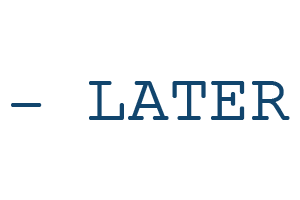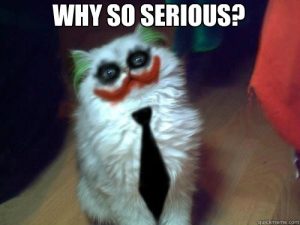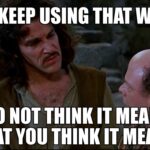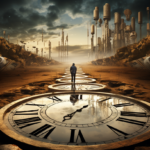LATER Hater
 After reading a few client scripts recently where LATER is actually used more often than DAY or NIGHT in scene headings, I figured it was time to address this issue.
After reading a few client scripts recently where LATER is actually used more often than DAY or NIGHT in scene headings, I figured it was time to address this issue.
If you’re fond of using LATER in your scene headings, then what I’m about to tell you might blow your mind…
Unless you’re dealing with a flashback, it’s already understood that EVERY subsequent scene in your script takes place later than the one that preceded it.
So expressly telling the reader that your scene takes place LATER is unnecessary… most of the time.
When should you use LATER?
As far as I’m concerned, there’s really only one legitimate use of LATER:
When you’re indicating that we’ve jumped ahead in time, in the SAME scene location.
Let’s take a look at the standard, recommended usage. Say you’ve established a scene heading with some description. For example:
INT. PRISON CELL – DAY
The Brooksville Killer paces back and forth, eyeing the steel bars. A rabid animal in a cage.
Now, suppose you want to jump to a moment that comes later in that same location. There are two methods you could use. 1) Write a new master scene heading:
INT. PRISON CELL – LATER
Or 2) Simply write a secondary scene heading (preferred)…
LATER
… and then write some action lines.
What you do NOT want to do is use LATER if your following scene takes place in a new location. Example:
EXT. PRISON YARD – LATER
There’s no reason to write LATER for the scene heading above. It’s not like the reader is going to get confused and think your character is somehow simultaneously in his cell and in the prison yard. Obviously, he’s moved from one location to the next over some unspecified time.
So you would simply use DAY (or NIGHT as the case may be) for the new location scene heading and then add your action lines:
EXT. PRISON YARD – DAY
The maniac hammers his fists against the concrete wall, over and over again.
Bits of the aged wall crumble in his hands... and an idea sparks in his eyes.
 Why so serious? What’s the big deal?
Why so serious? What’s the big deal?
There’s technically nothing wrong with writing LATER in subsequent scene headings. The problem is if it goes on for too long, it can confuse your reader.
If you keep writing LATER in your scene headings, eventually I’m going to forget whether it was day or night, or wonder if it has since transitioned from one time to the other. You’ve now made it more difficult for me to visualize the scenes.
When you make your reader struggle, that’s a bad thing.
Take this example:
EXT. PARK – DAY
Josephine and Tommy share a hot dog, each nibbling from opposite sides of the bun.
EXT. BAR PATIO – LATER
The lovers share a tropical drink... sipping from straws... gazing into each other’s eyes. If they weren’t so adorable, it would be cringeworthy.
The description is fine, but am I supposed to picture a brightly lit daytime patio or an atmospheric nighttime patio? The LATER throws me off.
One of the key jobs of a screenwriter is to set the scene for the reader. Do yourself a favor and use DAY or NIGHT in your subsequent scene headings to help you with that task.
What about MOMENTS LATER?
Typically, MOMENTS LATER is used like LATER — when you want to indicate a jump in time within the same scene location. However, in cases where the location has changed, and the context of the scene is such that the reader might incorrectly think the scene takes place long after the previous one (when it really takes place shortly after), it’s just fine to use MOMENTS LATER for clarity.
Here’s an example of it NOT being necessary:
INT. CLUB CRAVEN – NIGHT
Brandon flexes his muscles in a mirror as Lisa sidles up to him.
LISA
My uncle’s on his way. I told him how you cheated on me, and he said he wanted to... uh, talk to you.
BRANDON
(scoffs)
Whatever. It’s not like he’s--
LISA
He’s the UFC heavyweight champion.
EXT. CLUB CRAVEN – NIGHT
Brandon bursts out the front entrance in a full sprint. Races to his car as fast as his cowardly legs will carry him.
It’s not necessary to use MOMENTS LATER in the above example, because the context of the scene already tells us that it takes place moments after the previous scene.
But if you come across a situation that isn’t so clear cut, and it’s important to know that the scene takes place shortly after the previous one, using MOMENTS LATER instead of DAY/NIGHT will help to avoid any confusion. Take the following example:
INT. JIMMY’S BEDROOM – NIGHT
Little Jimmy sits alone in his room, sulking. He stares at the Einstein poster on his closed door.
JIMMY
I loathe all of you imbeciles. I shall never leave this room! Ever!
A warm voice calls from downstairs:
MOM (V.O.)
Jimmy, the cupcakes are ready.
INT. UPSTAIRS HALLWAY – MOMENTS LATER
Jimmy cracks open his door. Peeks into the hallway. Breathes in the intoxicating aroma of chocolate and frosting. Sighs.
JIMMY
The flesh is weak.
He hustles downstairs.
Using MOMENTS LATER in the above example helps to reinforce the timeline. If NIGHT were used instead, the joke of how quickly Jimmy caves may not be as clear.
Are you a LATER overuser?





I’m so happy you posted this, because I am dealing with EXACTLY this issue… what you did not mention, and what is likely the most critical point, is that as soon as you have a line producer on board they will make you replace all those superfluous LATERS with DAY or NIGHT so movie magic can read the headings properly. That it is the very first thing they told me to do. It was a huge chore to rewrite all the headings so please just save yourself the headache and format it properly from the start.
Hey Victor! That’s an excellent point. Another great reason to lose the superfluous LATERs. Thanks for the note.
What if it is the same location but a future date? Example, someone alone in an apartment then the next scene, same person, same apartment later date? Can you express the time of day and then later in parenthesis or would that also be confusing?
What an excellent question!
Simply using LATER wouldn’t cut it because it suggests later in the same time day or night, as the case may be.
There are three approaches which would be acceptable here:
1) INT. CAGE – DAY (3 DAYS LATER)
2) INT. CAGE – 3 DAYS LATER
3) DISSOLVE TO:
INT. CAGE – DAY
Thin, unshaven and weak, Jack lies on the makeshift bed. Clearly, a number of days have passed.
—-
So two scene heading options and one using a DISSOLVE and action lines to convey the passage of time. Never use DAY (LATER) — I don’t care what the circumstance.
Cheers!
Thanks so much!! I will definitely us the dissolve option.
You’re very welcome! That’s the option I’d go for too.
Hello!
I am writing a screenplay and i notice that i have to include a scene where the charters appear grown, after 5 years.
Could you please explain to me how to do this?
Hi Anto,
Great question! It really depends on whether the same actors will be portraying the characters when they’re five years older. If the characters are currently 12 years old, then there will certainly be different actors playing them at 17.
However, if the characters are 17 years old, then the same actors will probably play them at 22.
So… if it’s different actors, you would call your initial characters YOUNG JOHN or YOUNG JANE. Then when five years have passed, you would re-introduce them as JOHN (17) and JANE (17).
If the five-year difference allows for the the same actor to play both roles, then you would simply create a new scene heading, write an action line as usual, then write:
SUPER: “5 YEARS LATER”
That lets us know time has passed. Then you would simply carry on writing your script as usual. No need to re-introduce the characters.
Hi, just wanted to thank you for this installment. A quick google search brought me here, but I really enjoy your style, so I read on. I know this post is from 2016 originally, but I’d like give you a compliment anyway.
I actually just saw a more recent post you made about SAME and CONTINUOUS. I had a feeling ‘CONTINUOUS’ could be a headache as well as LATER, but it’s probably not as common? I feel like I’ve read over a screenplay that had 5+ scenes all with the CONTINUOUS tag, when it wasn’t really necessary.
Hi Kári, I really appreciate the kind words. Thanks!
CONTINUOUS is an interesting one. You really have three valid options:
1) Use CONTINUOUS. The reader will immediately grasp that the action continues in the scene without any gaps from the previous scene.
2) Use DAY/NIGHT. The reader will understand that the action is continuous from the context of the action lines.
3) Use nothing. In modern spec scripts, if the time section of the scene heading is left blank, it’s the more economical equivalent of writing CONTINUOUS. WARNING: If this method is used, you must be consistent. Using CONTINUOUS later in the script will throw off the reader and make them question if the previously blank sections of your scene headings were mistakes.
Cheers!
I have a question that has me confused.
It’s a little off-topic but placed in the same scene location; DAY & NIGHT.
When underground inside a tunnel or a room without any means to see the outside surface is “time of day” required in a scene?
Shalom.
Hi Shalom,
Great question! Yes, it’s always best to keep the DAY/NIGHT time indication, even when you can’t see outside.
It helps orient the reader as to the timing of scenes, and it can inform the fatigue levels, actions, etc. for characters.